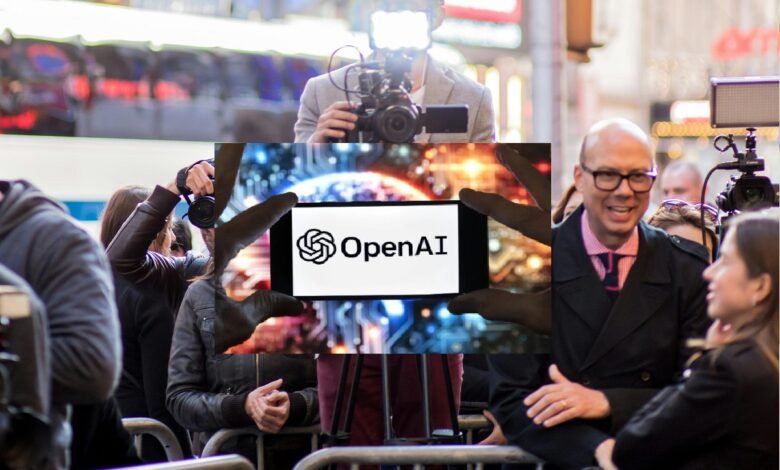Unveiling the Mystery: Journalists Troubled by OpenAI’s Content Deals

Intro: Journalists Troubled by OpenAI
Hence, the application of Artificial intelligence in journalism(Journalists Troubled by OpenAI) today has been a focus of discussion over the years. For instance, recent debate over the OpenAI Content Deals has raised controversies among journalists making many of them worried by implications of AI technology in the field. It is now time to go deeper into this discussion and discuss the issues regarding content contract by OpenAI with journalists.
DODO+THRILLIST+VOX Media Informative details
In the midst of digital flow we locate DODO, a series by Thrillist, and VOX Media caught in the crossfire between daily journalism and the future of AI. These platforms, which has recently been the source for their avant-garde content and complex narratives, have been at the center of the controversy called OpenAI Content Deals Controversy. Quite striking is that each entity, having its own voice and people to address, sets off to journey with OpenAI, with the hopes to carve a new path in produce contents. DODO, the lifestyle brand with its sense of humor and gravitas; Thrillist, the culinary compass, mapping the territories of food, drink, and travel; and VOX Media, the digital journalism and opinion titan, all are on the cutting edge of this AI venture. It also highlights that there are various ways the technology has become a part of journalism, breaking news, reception of information, and even e-fiction. These three media pioneers, with their partnership with OpenAI, pose a question to us regarding the destiny of the human storytelling process – whether it is entirely guided and accompanied by AI or it is a human evolution: Discovering a new section of the journalistic digital book. (Journalists Troubled by OpenAI)
The Crux of the Controversy: OpenAI’s Déals
Let us delve deeper into one more disturbing aspect that has arisen out of OpenAI’s content deals affecting journalism in a negative way. The core issue? A call for clarity. The tango between AI and Journalism has triggered much concern due to the following considerations: Firstly, there are unclear IT arrangements shrouding many of these partnerships. Feasibly, ten masked AI tools are being trained to fine-tune their algorithms taking the full-text collection of human-written articles as the input stream yet with no understanding of how this translates to the stories that become part of public discourses. This mystery has done more than simply raise eyebrows and stoke curiosity; it has also raised concerns in regards to the shift in the balance of power and who and what may be pulling the strings to shape the direction of content delivery. Reporters, columnists – the keepers of the original narrative – suddenly start feeling the ground slipping uncertainly into the digital unknown contemplating how AI is already stitching her thread into the tapestry, albeit without a manual. The articles’ focus is not on the use of AI-employed but the ‘how’ and ‘why’ of the training and employment of the system. This conversation is not only about skills and technologies; it concerns values, integrity, and a profession that has to rebuild its narrative of a genuine, raw, and ethically sound Enterprise. Journalists Troubled by OpenAI
Read More:- A Curious Case of Google AI Telling People to Eat Rocks: Overview Flaws Explored
Why Journalists Are Losing Sleep: The Fear As with any new and challenging experiences in life people have certain fears and concerns with regards to the external communication variable.
Suppose you are finally in a cold sweat trying to analyze what is happening night after night with the constant evolvement of the profession – journalism. Current journalists are surrounded by innovation and the emergence of thousands of opportunities in the form of new media platforms; artificial intelligence enters the horizon as the force that will shape the future of content creation. Although such a promise is made here, one can see a litany of questions emerging on tomorrow for the current generation of narrators. At the core of their worry, the British writer can hear the thump, thump of the fear that can be summarised in three words- Algorithms may takeover; stories may no longer be human. There is a constant fear that greatly incurred by the diverse thinking pattern and the multiplicity of opinions which can be erased by the AI system in the process of explaining news and several facts. Algorithms loom over algorithms and moral dilemmas concerning whether such creature brought about by artificial intelligence could haply distort fairness in reporting or twist debates in some grotesque way. Journalists, the keepers of the fourth estate, loom as they try to keep the spirit of the craft and afloat, not knowing how to get through these waters as human and artificial intelligence merge to form a convergence that must not destroy the art of storytelling in the New World. Journalists Troubled by OpenAI
The Union’s Uproar: Trending discrepancies and improprieties
In this cacophony of dismay, writers’ unions and journalism outlets have emerged to speak, their messages ringing out loud across the digital realm, with a simple cry for reason and justice. It’s not just clutter and fuss, but a loud whisper of protest from the overseers of writing, proclaiming that they deserve to know more about becoming an OpenAI content partner. The very essence of the search they embark on? Transparency. A requirement is to investigate the nature of the processes that go into training AI and its relationship with the art of journalism. These unions are not swimming against an oncoming tidal wave, instead they are attempting to steer the ship of progress with AI and journalism rights strong, ethical, and intertwined.
It is more than a call borne out of curiosity; it is a battle cry for excellence; a call for protection of values that sustain the art of story telling; a fight for the values that journalistic professionalism has been nurtured over the centuries. These organizations believe that the use of AI as a tool to augment human labor and intelligence is a positive concept; they hope for a world where the collaboration between a journalist and the machine will lead to new ideas and achievements without eliminating the need for human input and without reducing the nature and complexity of human perspectives. Journalists Troubled by OpenAI, They are not only fighting for the rights and the position of journalists, for the freedom of speech, for press freedom, for the principles of democracy and diversity, for the importance and the meaningfulness of investigative journalism; they are walking, talking, actively striving for the humane and the truthful, the honest and the ethical in the twinkling of an eye future of digital and social media.
OpenAI’s Stance: As the weather changes, it seems that many are searching for reasons to defend recent actions and behaviors.
While brouhaha and fuss are heard, and tensions continue increasing, OpenAI comes to make hope and confidence for more articulate and louder. The firm at the helm of this situation offers an obverse, in which AI acts as a complement to creativity, not its eradicator. As OpenAI has stated, their partnership with media corporations is not a sign of the end of independent journalism or the assertion that pen is mightier than the soul but an effort to allow AI to be the catalyst for creativity and journalistic inspiration. They only live in a world where AI would complement the journalist in finding patterns in the clutter of information filtering out news triggers providing inputs for ideas and thereby improving the art of narration. OpenAI actively tries to avoid such conceptions, diligently pointing out that its goal is to help people and not compete with them. AI enthusiasts also claim that media reporters can enhance their stories and even reach new formal and informal conceptions of reality through the power of digital technologies. Thus, demanding for more elaborate forms of work, OpenAI gives a hope of optimization not as a grim takeover of the industry by cold metal thinkings, but as a symbiosis between man and machine, striving to bring the best of what journalism is capable of to the forefront. Journalists Troubled by OpenAI
The Future of Journalism from The Bigger Picture
The OpenAI Content Deals Controversy drama isn’t just a passing brouhaha, it’s a climactic scene in the emerging story of the future of journalism. With AI technology becoming more integrated in the process of news-making, the face of journalism is on the cusp of a major overhaul. At the heart of it, this shift is about innovating without losing your soul. Reporters have a brave new world ahead of them thanks to AI paving the way, now unearthing what is and fabricating what matters. With man and machine both prying and partnering in symbiosis, this crusade involves bridging a technology-led worldview with our narrative and value systems — preserving the journalistic ethos even as techno-centric society is fast forward.
It needs to walk the fine line between technology and ethics in storytelling, making sure that the essence of journalism remains constant even amidst rapidly growing technology. Mixing AI with journalism gives the craft a bit of a renaissance — a revive of the storytelling technique, using AI as medium and not as the storyteller. This time also calls for journalists to redefine their purpose; employing AI will only be an additional resource to enhance their storytelling, promoting a more knowledgeable and informative interests(handler). We find ourselves at this inflection point where the path of journalism is lit up with the potential of the use of AI for good, pointing to a world in which information illuminates and stories inspire, all the while rooted in the foundational pillars of journalism ethics.
The Future of Journalists and AI as they Chart Unknown Territories
Obviously, it is a bold new world where the borders of journalism and AI meet, and journalists must be part of building a mutually-beneficial relationship with technology. Navigating them will require journalists not just to understand the technology itself but also to find ways to arm themselves with both knowledge and curiosity about AI. Journalists, by getting involved with AI builders and contributing to the design of ethical frameworks, can shape how AI tools advance the storytelling pipeline without trading away the very soul of journalismwaitFor] In contrast, as an ally in the pursuit of what it true but also compelling, AI can help journalists improve their craft in ways that were not possible before.
The race is on The path forward demands both innovation and integrity, exploring how AI can be a force for good for journalism. Journalists and AI can, together, lead us to a future in which stories are not just told but are also genuinely listened to, gripping human beings with the heart and soul that is possible only through human-machine collaboration.



